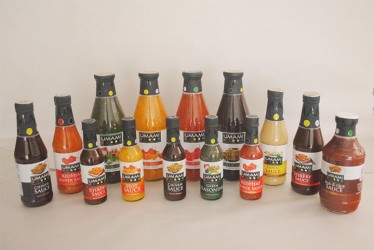Chris and Chanchal Persaud believe that Umami, their nearly two-year-old local enterprise has some distinct competitive advantages over similar businesses here in Guyana and almost certainly elsewhere in the region.
On the whole, local food-processing enterprises, commendable as many of the efforts have been, have had their roots in trial and error, many of them having had their origins in family kitchens and in repetitive experiments in creating seasonings and sauces for home use which, over a period of time become transformed into modest commercial initiatives.
When Chris, a University of Guyana graduate returned home from Grenada after an absence of a decade he brought with him the experience of having served, first, in St Lucia with the Guyanese-owned Baron Foods brand, arguably the most accomplished regional manufacturer of sauces and condiments. After St Lucia, he had been posted to Grenada to spearhead the growth of the brand there. No less significantly Chris infused the practical knowledge that he had secured from his degree in Chemistry into the manufacturing process. That allowed for his understanding of the organoleptic appeal of the product, that is, the manner in which it appeals to the consumer’s senses of sight, sound, taste and touch.

Translated from its Japanese origin, the company’s brand name – Umami – means pleasant-tasting; the choice of name is actually a marketing ruse to evoke consumer interest and curiosity. That, Chris says, applies to the more than ten condiments and food sauces manufactured by the company. The Persauds’ return to Guyana to do business here was driven mostly by Chris’ desire “to pioneer something of my own.”
Grenada, he said, with its small population, provided neither the challenge nor the requisite market appeal to match his vision. Besides that, he says, “Guyana was home, anyway.” The decision to return to Guyana, he says, has been vindicated by the fact that by the end of last year, the UMAMI brand had secured a 78 per cent brand equity on the local market. This feat, he says, that has been accomplished through sustained attention to produce quality as well as the application of marketing techniques that he had refined during his earlier tilt at the industry in
St Lucia and Grenada. These days, much of his preoccupation is with consolidating what he says is the company’s already high standards. In the near future Umami’s present production base at Lusignan will be superseded by a multi-million-dollar state of the art facility on a 30,000-sq ft plot at Unity. Chris says that the focus is on “growth and expansion. Frankly, as far as the Guyana market is concerned we do not regard our serious competition as coming from similar local products. It is the imported local products that we treat as the real competition.”
He is quick to place that comment in context pointing out that, among other things, it seeks to draw attention to the work that still needs to be done in the local agro-processing industry to raise quality standards to a level where it can seriously compete with the requirements of the more lucrative markets. He draws attention to the current thicket of safety standards that have been enshrined into law in North America and which, for the present at least, effectively present a barrier to a range of local agro-processed products competing on what are, in effect, the most lucrative markets.
When asked about the extent to which his own standards have met the demanding requirements of the United States’ 2010 Food Safety Modernization Act (FSMA) he confidently says that Umami’s operations are open to inspection by the US authorities “any time.” Chris
says that Umami’s 13 employees have all been imbued with the same spirit of reaching for the next challenge. “The truth is, we are a restless company, always searching for opportunity to go forward,” he says, hinting at the contemplation of an initiative to investigate the manufacture of vegetable oil. “It occurs to us that there is no facility for vegetable oil production here…” That, however, might only be the tip of the iceberg for a company whose founder believes that the only barriers to its growth are those that are imposed by a lack of vision, knowledge and ingenuity.





